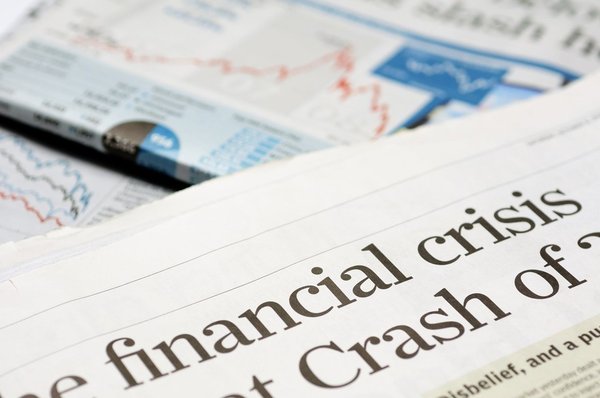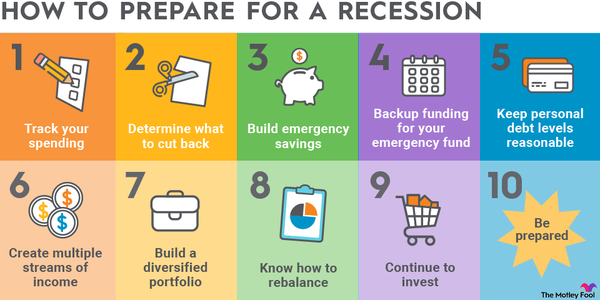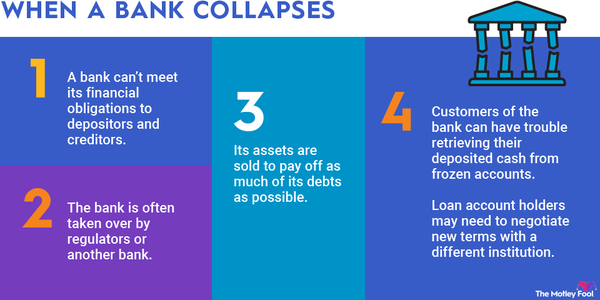Stock market crashes are a part of investing. We can't tell you when the next crash is coming; stock market crashes are inherently unpredictable. If we could predict the next crash, we'd prevent it in some sort of Minority Report for investing. At some point, an unforeseen event will cause a big market decline, and you'd better be prepared when it happens.
Ways you can get ready for the next stock market crash are by understanding your investments and why you chose them, allocating funds appropriately for your investment goals, and planning what you want to accomplish during the crash.
Why the stock market crashes
A crash is a sudden drop in stock prices over the course of just a few days. This can happen in any market environment, but it typically happens after prolonged periods of strong price performance. Investor panic, usually set off by external economic or political events, can build on itself with selling pressure causing prices to drop precipitously.
For example, the stock market crashed in February 2020 as the rapid spread of COVID-19 worsened investors' outlook for the global economy. That fear was further enhanced as the market crashed, leading to an even bigger sell-off in March.
Not all stock market crashes are as straightforward as the 2020 one, but they all have one thing in common. Investors panic and sell because they fear the market will keep dropping. That creates a vicious cycle and a self-fulfilling prophecy -- but only for a short period.
How to better prepare yourself for a stock market crash
For investors with a long-term time horizon, there's a lot you can do to weather a stock market crash.
1. Make sure you understand your investments
If you buy individual stocks, make sure you're buying them for good reason. Don't just buy shares in a company you've never heard of because your sister-in-law said it's a great investment. You should have a thesis for each company you own. Why will it appreciate in value over time? Truly understanding your investment decisions and what you own will help you assess your stocks in both good times and bad.
If you're an index fund investor, the same rules apply. Perhaps you own a U.S. total stock market index fund because you believe, like Warren Buffett, that you should never bet against America. If that's the case, you won't fret when that index fund drops 10% or 20% in price in just a few days.
2. Know what you want your money to do
If you know what you want your money to do for you, you'll be better able to withstand a stock market crash.
If you want to maximize long-term growth, you should be putting as much money as you can into a diverse group of stocks. Few, if any, investment options have shown a consistent history of outperforming the stock market. But part of that investment plan ought to be an expectation that you'll occasionally see 10%, 20%, or even 40% of your wealth disappear on paper for some period of time.
If you plan on retiring soon and you need to preserve capital more than you need to increase your savings, that should be part of your plan. Holding a diversified portfolio of assets with negative price correlations will reduce the impact of a stock market crash on your overall portfolio, but it comes at the cost of lower expected long-term growth.
3. Have a plan
A stock market crash is practically inevitable, so it's important to think about what you might want to accomplish when one happens. You can put some things in place now in order to help you follow the plan.
For example, you may want to have some extra cash on the sidelines. That cash could be used as an emergency fund if the stock market crash coincides with an economic downturn and potential job loss. You could also put that extra cash to work by buying stocks after they've come down in price.
If you maintain a diversified portfolio with a certain asset allocation, make a plan for how and when you'll rebalance your portfolio. Using guardrails for how far off your target allocation you'll allow your portfolio to wander is more effective than rebalancing on a set time interval. A stock market crash is likely an opportune time to sell Treasury securities and buy stocks since they usually move in opposite directions.
Related Investing Topics
What to do when the market's crashing
If you properly prepare for a stock market crash and have a plan in place, now's the time to execute the plan. If you've never experienced a stock market crash before, you may be hesitant to actually do what you planned to do as you feel fear or anxiety perpetuated by the ongoing crash. That's important to make note of and remember for the future. Every crash is different, but you can get a better feel for them each time one occurs.
Take the time to assess your investments instead of engaging in panic selling. Make sure your thesis remains intact and isn't impacted by any economic or political events that may have triggered the market sell-off. If not, it may be time to dump the stock and free up cash for better opportunities. Note that it's very rare for a market crash to be caused by something that completely nullifies your original investment thesis for a company.
Once the market's recovered or on a clear path toward recovery following a crash, it's an opportune time to assess how you performed. Did you stick to your plan or did you let fear guide you? Did you sell stocks you should have kept because not much fundamentally changed? Conversely, did you keep stocks you should have sold because the investment thesis is no longer true?
If you had trouble following your plan, you likely want to adjust your asset allocation to reduce the negative impact of a stock market crash in the future. If you had no problem sticking with what you wanted to accomplish, you might consider adjusting your asset allocation to be more aggressive and putting more of your money into stocks in order to maximize your long-term returns.
A stock market crash is an opportunity to learn and grow. If you're prepared for their inevitability, you can become a successful investor.














